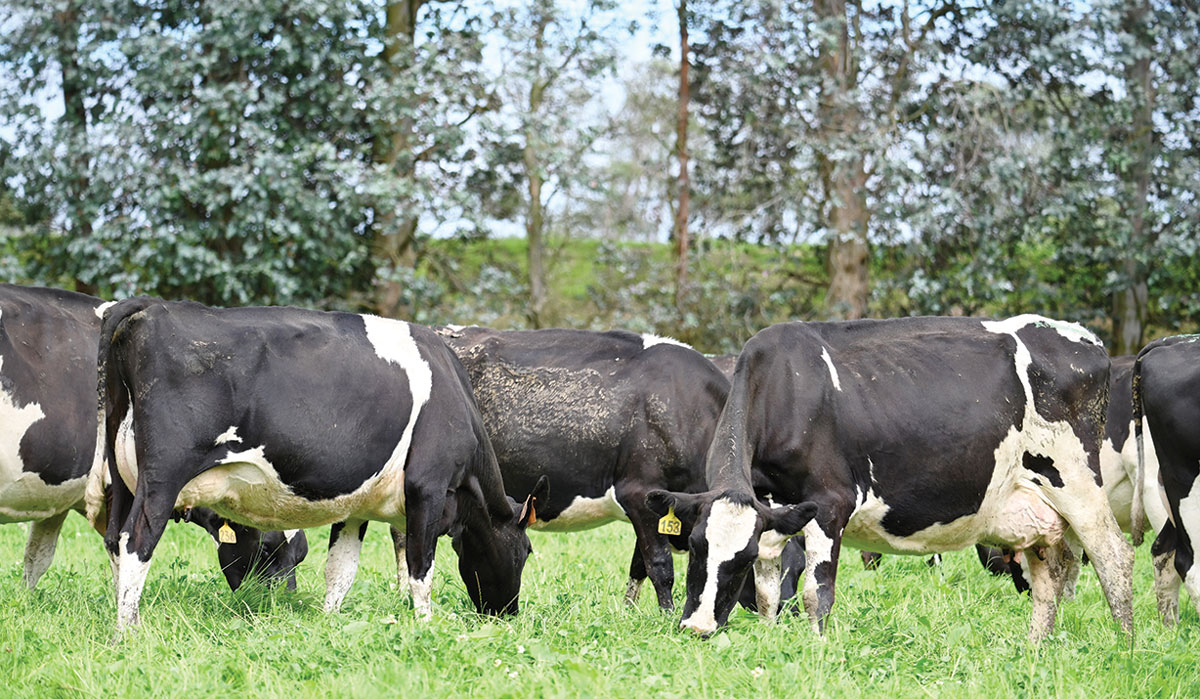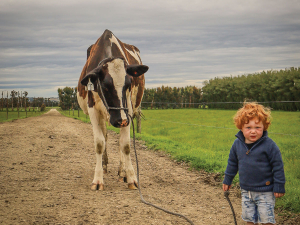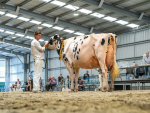"I grew up as a townie in Wanganui, and I visited a dairy farm aged 16 with a friend of mine," she says. "I saw the cows and they reminded me of horse, which I loved. I fell in love."
After finishing school, Renae went straight into dairy farming. She changed course for five years, working with racehorses while continuing to relief milk, before going into farming fulltime in the 2010/2011 season.
Her first full-time role back farming was as a farm assistant for Jason Halford, who re-sparked her passion for dairy farming and led her to chase her dream of becoming a 50:50 sharemilker.
She then took a job in Taranaki for one year as a junior 2IC, before returning to the Manawatu in a 2IC role. After a few years she then took a manager's role on a sole-charge farm for a few years; on this farm she won the Manawatu Dairy Manager of the Year at the Dairy Industry Awards.
Renae then went contract milking for six years on her own, milking Ayrshires, before taking one year off to have her son William, born in 2022. She took on a relief milking job for Amy Baker (Fusion Genetics).
In February 2023 she, husband James and William made the big move to South Otago to 50/50 sharemilk.
Read More:
"The first six months were crazy: coming down to South Otago's worst drought in 60 years, settling in and learning a new farm and cows - and made more challenging by the fact that James was away working, driving stock trucks in the North Island," she says.
James works on the farm during spring, and for the rest of the year works off farm doing industry-related work such as driving stock trucks and tractor driving.
"It's another income source for us," Renae says. "The farm is mostly a one-person farm once the busy period is over and the crop are all in."
Currently they milk 250 cows on 100ha at Balclutha for Hamish Anderson. They milk predominantly Holstein Friesians, with some Ayrshires.
In the 2023/24 season, they produced 380 kgMS per cow, a season Renae is happy to put behind her.
"We came into the most terrible year, with the worst drought - we had just over 500mm of rain in 12 months, which meant limited grass growth and a farm spending a year under too much pressure," she says. "We get everything down here, from drought to snow."
The farm had had limited re-grassing, so they hit the farm with re-grassing and over-sowing this season.
"The farm is turning around slowly," Renae says proudly. "We are getting a lot of comments from local farmers saying that when they drive past, they can see a huge improvement in how the farm looks, which means we are tracking in the right direction."
Last season, Renae set a production target of 100,000 kgMS - around 400 kgMS/cow - on a system 2, predominantly grass-based system. They surpassed that target, achieving 109,000 kgMS, or 430 kgMS/cow.
Renae says she is surprised the herd did so well, considering the fact that in early October 2024, they lost 70% of the farm underwater in the floods that hit South Otago.
"We got 160mm of rain in 24 hours," she says. "We got warning the rain was coming so we had plenty of supplementary feed to get through and I thought I was as prepared as possible - but I just wasn't prepared for how much of the farm went underwater."
Renae says having a sacrifice paddock to feed out on, and the extra supplement, meant the cows got through the stressful situation relatively unaffected - or so she thought, until the following months when the lame and sick cows kept coming.
"It was a very stressful few months, but we are now on the other side of the situation and we didn't lost any cows through the ordeal, thankfully - the Friesians are tough girls," she says.
Mating Results
Renae Martin said she's hoping the ordeal hasn't affected mating results.
"Realistically, going through that has possibly had some effect, but nothing major I've seen so far," she says.
The herd’s calving start date was originally August 15, but this season Renae pulled it forward to July 29.
 |
|---|
|
The herd surpassed production target last season despite 70% of the farm being underwater during flooding in early October 2024.
|
“We found our worst weather months were late September/October, so it’s easier to have all the cows calved before the weather hits, and to be able to manage them better during those times,” she says.
Renae says with a drier July and August the grass grows slowly, so as long as she stays at a slower round length the farm can handle the early calving more easily.
“We don’t have a herd home or anything like that, so we need to work around the weather to ensure the cows don’t suffer from weather impacts during the crucial time of the year,” she says.
They keep 65 replacement heifers and 30 beef cattle on the property.
“We are surrounded by river, so we keep beefies to keep the flood bank pasture down and maintained,” Renae says.
Mating starts October 24, which involves six weeks of AI and five weeks of Hereford bulls.
Renae says they brought 50 cows down with them from the North Island, consisting of Holstein Friesians and Ayrshires, and then bought the majority of the herd that was already on farm, which was comprised fully of LIC Holstein Friesian cows - the commercial herd, Renee calls them.
“We’re looking for a happy medium between the large and small Holsteins Friesians,” she says. “The big, tall Holstein Friesians struggle a bit on low input systems.
“We are looking for our udders to go a lot higher and wider at the top, and fertility is a massive focus as we feel there is a small fertility issue within the herd,” she says. “We’d also like to up the components in the milk by using fat and protein bulls.
“Longevity and somatic cell count are important considerations for us. The herd we had was all young; there was no longevity. We love having cows for as long as we can.”



















